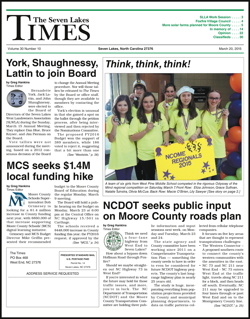 A vote on a dues increase for Seven Lakes Landowners Association members looks increasingly likely next Spring, and Treasurer Conrad Meyer, along with the Finance and Long Range Planning Committees, has begun methodically crafting the analysis that will help the Board determine exactly how large an increase is necessary.
A vote on a dues increase for Seven Lakes Landowners Association members looks increasingly likely next Spring, and Treasurer Conrad Meyer, along with the Finance and Long Range Planning Committees, has begun methodically crafting the analysis that will help the Board determine exactly how large an increase is necessary.
Meyer repeated, during Wednesday's meeting, a presentation on the history of SLLA dues that he had given during the Board's Monday, July 9 Work Session. [Read our report on that presentation or download a copy of the slides.]
Looking back ten years, Meyer found that homeowners dues had increased in 2005, and again in 2009 and 2010. However, those most recent increases -- a total of $100 -- were allocated solely to building a restricted reserve for road repaving and state-mandated dam repairs. The portion of homeowners dues used to run the Association and to build unrestricted reserves for the maintenance of infrastructure other than dams and roads has remained at $800 since 2005.
Even taking the extra $100 for restricted reserves into account, the growth in Association dues hasn't kept pace with inflation. As inflation pushes operating expenses gradually higher, Meyer explained, less and less money is left to place in unrestricted reserves to pay for new paint, new shingles, and other needed repairs to community assets.
Moving on to the dues paid by lot owners and the reduced dues paid for any second or third lot owned by the same person, Meyer said he was surprised to discover that the $50 increase for roads and dams implemented in 2009 and 2010 did not apply to undeveloped lots. Only homeowners were required to contribute to road and dam maintenance.
Too Little Money for Repairs
"If we have a surplus every year, then why is the money you are taking in not sufficient?" one resident asked.
Meyer explained that the Association, in years past, has typically seen revenues exceed operating expenses by about $200,000 each year. That extra money is put into the unrestricted reserve, which is in turn used to pay for infrastructure repairs and upgrades.
"This year we were down to $70,000 to put toward reserves," Meyer said. "With all the things called for in the Reserve Study, $70,000 is a drop in the bucket."
Meyer said the Finance Committee's next step will be to re-examine all the items in the Reserve Study, in order to fine-tune the Association's capital maintenance needs. The study, which was based on the assets in use several years ago, includes the replacement of a dump truck and backhoe -- items the that may not need to be replaced, since landscape maintenance is now being handled by an outside firm.
In addition, Meyer said, the Committee will attempt to refine the prices for various capital items in the study, as well as the timing.
"Once we do that, that will be what we want to spend," Meyer said, "and then you can look at various options for a dues increase. If we said we wanted a $100 dues increase, then we could say: Here's what we would be able to do with that, and the timing."
"I don't know what the answer is going to be," he added. "I don't think a dues increase of zero is going to be the right thing."
Meyer noted that some communities in the area tend to have a small dues increase every year, while the SLLA has tended to have much larger, less frequent increases.
"I understand a lot of folks in the community have with fixed incomes," he added. "We may have to make some tough choices on what we provide in services if the community isn't willing to increase dues." Any proposed dues increase must be approved by a vote of the membership.
Reserves Policy Approved
At the recommendation of the Finance Committee, the Board unanimously approved a formal reserves policy, something the Association has not had in the past.
The policy formalizes the two reserve funds already in place: the restricted reserve, which can only be used for road repaving and state-mandated dam repairs; and the unrestricted reserve, which is used for all other capital maintenance items.
What is new in the policy is that it carves $300,000 -- about three months of Association operating expenses -- out of the unrestricted reserves as an "emergency capital reserve."
"We don't have a line of credit," Meyer explained. "We don't have credit card with $100,000 limit. I'm not sure we have ever done a loan. The concept is, if we go through with spending a lot of money on roads and infrastructure, that we don't spend ourselves out of money."
The new policy specifies that any interest earned on the reserve accounts will be logged as operating income, which Meyer said simplifies the accounting.
In other Finance business, Meyer reported that the Committee had completed the annual inventory of assets and forwarded it to the auditor. He noted that Committee is developing a better process for adding and deleting assets over the course of the year.
